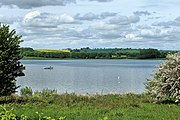Wikipedia:Main Page history/2019 January 21
From today's featured articleJane Austen's novels have risen in popularity in recent decades, becoming the subject of intense scholarly study and the centre of a diverse fan culture. Austen, the author of Pride and Prejudice (1813) and Emma (1815), is one of the most widely read novelists in the English language. During her lifetime, her novels brought her little personal fame; like many women writers, she published anonymously. When they were published, her works received few positive reviews. By the mid-19th century, her novels were admired by members of the literary elite, but it was not until the 1940s that Austen was widely accepted in academia as a "great English novelist". The second half of the 20th century saw a proliferation of scholarship exploring artistic, ideological and historical aspects of her works. The 1940 film Pride and Prejudice was the first of many television and film adaptations. In the 21st century, Austen fandom supports an industry of printed sequels and prequels. (Full article...)
Recently featured:
Did you know...
|
In the news
On this dayJanuary 21: Martin Luther King Jr. Day in the United States (2019)
Chaim of Volozhin (b. 1749) · Eusapia Palladino (b. 1854) · Frances Gertrude McGill (d. 1959)
More anniversaries:
|
From today's featured list
There are 19 Sites of Special Scientific Interest (SSSIs) in Rutland, a landlocked ceremonial county in the East Midlands of England. SSSIs are designated by Natural England, a non-departmental public body which is responsible for protecting England's natural environment. Designation as an SSSI gives legal protection to the most important wildlife and geological sites. Sixteen of the 19 SSSIs in Rutland are designated for their biological importance, one for its geological importance and two under both criteria. The largest site is Rutland Water (pictured) at 1,555 hectares (3,840 acres), a Ramsar internationally important wetland site and a Special Protection Area under the European Union Directive on the Conservation of Wild Birds. The smallest is Tolethorpe Road Verges at 1.0 hectare (2.5 acres), which has several regionally uncommon plants on Jurassic limestone. (Full list...)
Today's featured picture

|
The curlew sandpiper (Calidris ferruginea) is a small wader that breeds on the tundra of Arctic Siberia. It is a strongly migratory bird, wintering mainly in Africa, but also in Australia, New Zealand, and south and southeast Asia. The curlew sandpiper is similar to the dunlin, and has a length of 18–23 cm (7.1–9.1 in) and wingspan of 38–41 cm (15–16 in). In breeding season it has a bright red underside. This picture shows a curlew sandpiper in Thailand, with its winter plumage. Photograph: JJ Harrison
Recently featured:
|
Other areas of Wikipedia
- Community portal – Bulletin board, projects, resources and activities covering a wide range of Wikipedia areas.
- Help desk – Ask questions about using Wikipedia.
- Local embassy – For Wikipedia-related communication in languages other than English.
- Reference desk – Serving as virtual librarians, Wikipedia volunteers tackle your questions on a wide range of subjects.
- Site news – Announcements, updates, articles and press releases on Wikipedia and the Wikimedia Foundation.
- Village pump – For discussions about Wikipedia itself, including areas for technical issues and policies.
Wikipedia's sister projects
Wikipedia is hosted by the Wikimedia Foundation, a non-profit organization that also hosts a range of other projects:
Free media repository
Wiki software development
Wikimedia project coordination
Free textbooks and manuals
Free knowledge base
Free-content news
Collection of quotations
Free-content library
Directory of species
Free learning materials and activities
Free travel guide
Dictionary and thesaurus





